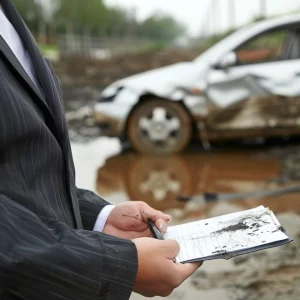Navigating the aftermath of a vehicular accident can be overwhelming, especially when it comes to understanding the legal requirements and consequences. In Texas, leaving the scene of an accident is a serious offense with potentially severe repercussions.
This comprehensive guide will walk you through the critical aspects of Texas Transportation Code and what you need to know if you’re involved in an accident.
Understanding Texas Transportation Code
The Texas Transportation Code sets forth the rules that drivers must follow in the event of an accident. Specifically, Title 7, Subtitle C, Chapter 550 of the Texas Transportation Code outlines the duties following a collision, investigation procedures, and reporting requirements.
Duties Following a Collision
When a collision occurs, drivers have specific responsibilities under the law. According to Subchapter B, here are the key duties:
- Sec. 550.021: If there’s a collision resulting in injury or death, the driver must immediately stop, return to the scene if they’ve left, determine if anyone requires aid, and remain at the scene until they’ve fulfilled the requirements of providing information and aid.
- Sec. 550.022: In accidents involving only vehicle damage, drivers must stop and remain at the scene without obstructing traffic. If the accident occurs on a freeway, drivers should move their vehicles to a suitable location to complete the necessary requirements.
- Sec. 550.023: Drivers must give their name, address, vehicle registration number, and insurance details to anyone injured or involved in the collision. They must also show their driver’s license if requested and provide reasonable assistance to the injured.
Investigation and Reporting of Collisions
Peace officers play a crucial role in investigating collisions. According to Sec. 550.041, they may investigate a collision resulting in injury, death, or property damage of at least $1,000. They must file a report of their findings electronically with the Texas Department of Transportation within ten days of the collision, as stated in Sec. 550.062.
The collision report forms, as required by Sec. 550.063 and Sec. 550.064, must be approved by the Texas Department of Transportation and the Department of Public Safety. These forms require detailed information to disclose the cause, conditions, and parties involved in the collision.
Legal Consequences of Leaving the Scene of an Accident
Failing to fulfill the duties outlined in the Texas Transportation Code can lead to significant legal trouble. If a driver leaves the scene of an accident, they may face the following penalties:
- Second-degree felony: This applies if the collision resulted in a fatality, with potential penalties including two to 20 years in jail and fines up to $10,000.
- Third-degree felony: If the collision resulted in serious bodily injury, the driver could face two to 10 years in jail and a $10,000 fine.
- Misdemeanor charges: For accidents involving only property damage, the severity of the misdemeanor depends on the extent of the damage.
Impact on Personal Life
The consequences of a hit-and-run charge extend beyond the courtroom. A conviction can lead to a license suspension, making it difficult to carry out daily activities. It can also affect your ability to secure housing or employment, as landlords and employers may be hesitant to engage with individuals with a criminal record.
Defense Strategies
There are several defense strategies that can be employed if you’re charged with leaving the scene of an accident:
- Lack of knowledge: You may not have been aware that a collision occurred.
- Influence of prescription drugs: If you were under the influence of prescribed medication that affected your ability to drive or make decisions, this could be a viable defense.
- Panic or shock: The natural human response to a collision can sometimes lead to irrational behavior, such as leaving the scene without realizing it.
- Immediate medical need: If you were severely injured, seeking medical attention might have been your first instinct, leading you to leave the scene.
At Adley Law Firm, we understand the complexities of these situations and are prepared to provide the legal support you need. Our experienced attorneys can help navigate the legal system and work towards the best possible outcome for your case.
Legal Representation and Advocacy
Should you find yourself facing charges for leaving the scene of an accident, it’s crucial to seek skilled legal representation. At Adley Law Firm, our dedicated team is committed to defending your rights and ensuring that your side of the story is heard. Here is how we can assist:
- Evidence Collection: We meticulously gather evidence, including witness statements, traffic camera footage, and vehicle data, to build a robust defense.
- Navigating Courtroom Protocol: Our legal experts are well-versed in courtroom procedures and will advocate on your behalf throughout the legal process.
- Investigating the Accident: We thoroughly investigate the circumstances surrounding the accident to uncover pivotal details that could influence the outcome of your case.
Our approach is tailored to the unique circumstances of each case, ensuring that we address all aspects of your situation and work towards the most favorable resolution.
Frequently Asked Questions
When it comes to leaving the scene of an accident in Texas, there are common questions that arise. Here are some answers to those pressing concerns:
Can the other driver sue me if I didn’t cause the accident?
Texas follows a proportionate responsibility system, meaning you can’t generally seek damages if you’re more than 51 percent at fault. However, leaving the scene doesn’t protect you from criminal charges, and you’re still obligated to stop regardless of fault.
Is it difficult to locate an absent driver after a hit-and-run?
The difficulty in locating a driver after a hit-and-run varies. Law enforcement may find the driver quickly or it may take extensive investigation. If you’re in such a situation, it’s wise to contact Adley Law Firm to prepare for potential charges.
Is there a difference between a hit-and-run and leaving the accident scene?
There’s no significant difference; both terms refer to the act of leaving an accident scene without fulfilling legal obligations, such as exchanging information or rendering aid.
Conclusion
Leaving the scene of an accident in Texas carries serious legal repercussions that can impact your freedom, finances, and future. Understanding your duties under the Texas Transportation Code is paramount to protecting your rights. If you’re involved in an accident, remember to stop, provide necessary information, and render aid if needed.
In the event that you’re charged with leaving the scene of an accident, know that you don’t have to face these challenges alone. The experienced attorneys at Adley Law Firm are here to offer guidance, support, and a vigorous defense. Contact us today to ensure that your legal rights are upheld and to work towards the best possible outcome for your case.












